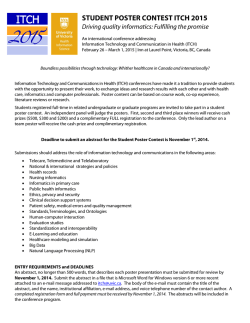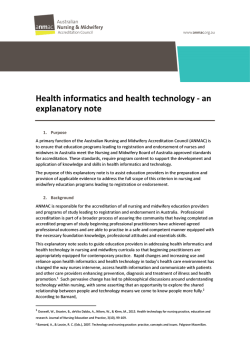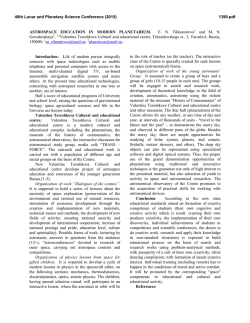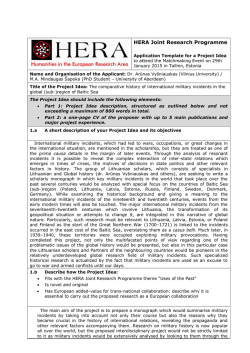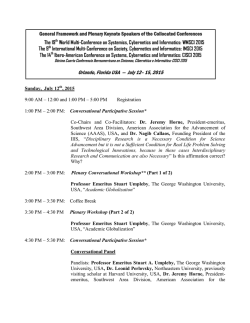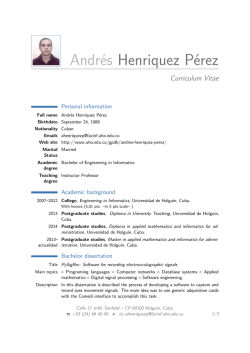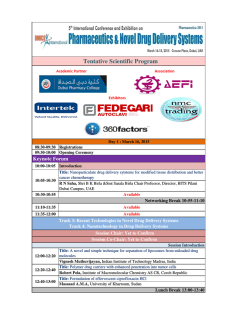
IFIP2015 Vilnius - A New Culture of Learning: Computing and Next
Venue International Programme Committee The conference will be held in the Parliament (Seimas) Palace of the Republic of Lithuania and hosted by the Vilnius University in cooperation with Lithuanian Computer Society. Accommodation Several hotels and hostels will be suggested. Social activities o o o Guided tour through the Parliament Palace Sightseeing tour Conference dinner Eric Sanchez (co-chair), Ecole Normale Supérieure de Lyon, France Mary Webb (co-chair),, King's College London, United Kingdom Andrej Brodnik (editor), University of Ljubljana, Slovenia Cathy Lewin (editor), Manchester Metropolitan University, United Kingdom Christine Bescherer, University of Education Ludwigsburg, Germany Valentina Dagienė, Vilnius University, Lithuania Barbara Demo, University of Turin, Italy Caroline Jouneau-Sion, French Institute of Education, France Johannes Magenheim, University of Paderborn, Germany Peter Micheuz, University of Klagenfurt, Austria Ralf Romeike, Friedrich-Alexander-Universität ErlangenNürnberg, Germany Sindre Rosvik, Volda University College, Norway Robert Munro, University of Starthclyde, United Kingdom National Organising Committee Vilnius University, Lithuania International Federation for Information Process sing IFIP TC3 Working group 3.1 “Informatics and Digital Technologies in School Education” IFIP TC3 Working Conference A New Culture of Learning: earning: Computing and Next Generations enerations July 1–3, 2015, Vilnius, Lithuania Valentina Dagienė (co-chair) Anita Juškevičienė (co-chair) Simona Feiferytė Eglė Jasutė Tatjana Jevsikova Eimantas Pėlikis Inga Žilinskienė Important dates More information on a conference website: http://www.ifip2015.mii.vu.lt 25th February Conference Contact Valentina Dagienė [email protected] Anita Juškevičienė [email protected] 15 March Submission of papers (full and short) th Other contributions deadline th Notification of acceptance th 15 May Early bird 1st to 3rd July Conference dates 15 April Conference website http://www.ifip2015.mii.vu.lt A New Culture of Learning: Computing and Next Generations IFIP TC3 Working Conference IFIP TC3 education has a tradition of organising exciting conferences which stimulate discussion, foster the exchange of ideas and knowledge, and generate more informed understanding of the issues of Informatics and digital technologies in education. This is a Working Conference focusing on developing new directions for learning and teaching in e-Education and Informatics in school and higher education in an increasingly globalized world. Key questions that we expect to discuss at the conference are: o What do we want the next generations to learn? o What do we propose as new developments in Informatics (Computing, Computer science) teaching and e-Education? o How can we support a sustainable education for all children in a digitalized world? o How can we influence teaching and learning at school by improving Computer Engineering Education / Informatics Education? o How can we research changes that are happening and provide evidence to support future developments? Conference themes Conference activities Themes of the conference include: Full papers, describing unpublished, original research related to one of the themes or subthemes of the conference (max. 10 pages) are invited. I. II. New approaches to learning (collaboration, informalisation, personalisation of learning) o Distance education o E-learning o Flipped classrooms o Gamification o MOOCs o Digital traces and assessment Challenges for teachers/learners and other stakeholders o National curricula and approaches to establishment of Informatics in schools o Digital literacy o Digital Fluency o Digital media education o Informatics teacher training and competencies o Computational thinking o Computing for all Participants III. Promoting and supporting Informatics education o The contribution of Informatics to a solid general education o Approaches for creative learning in Informatics o The practice of teaching Informatics o Informatics education research o The use of technology in Informatics teaching and learning o Exams in Informatics and assessing Informatics competencies o Informatics topics in schools beyond programming and algorithms The conference aims to bring together teachers, researchers, education policy makers, and administrators, involved in digital technologies and Informatics teaching or using digital technologies in teaching and learning. IV. Researching educational change o Methodological challenges and solutions o Theoretical perspectives o Building knowledge o Identifying research priorities These questions and others that may be generated should be examined in relation to past experiences and future expectations. We also invite doctoral students, newly qualified teachers and young people to contribute their perspectives. Short papers (max 5 pages) describing novel didactical approaches, methods, tools, findings, interpretations, explanations, or other contributions presented in a solid scientific framework, including empirical evaluation are most welcome. Proposals for panels, adversarial debates, workshops and specific focus groups are encouraged as conference contributions. All submissions will be refereed according to international standards. Submission guidelines as well as evaluation criteria will be available on the conference website. Publication A book of abstracts, including paper abstracts, details of panels, workshops, focus groups and adversarial debates, will be published and made available to conference attendees. Selected papers will be published in a special edition of the internationally refereed journal “Education and Information Technologies”, ISSN: 1360235. Additionally, extended versions of selected papers on Computer Engineering Education topic will be considered for publication in a special issue “Computer Engineering Education” of the International Journal of Engineering Education, ISSN 0949-149X.
© Copyright 2026
